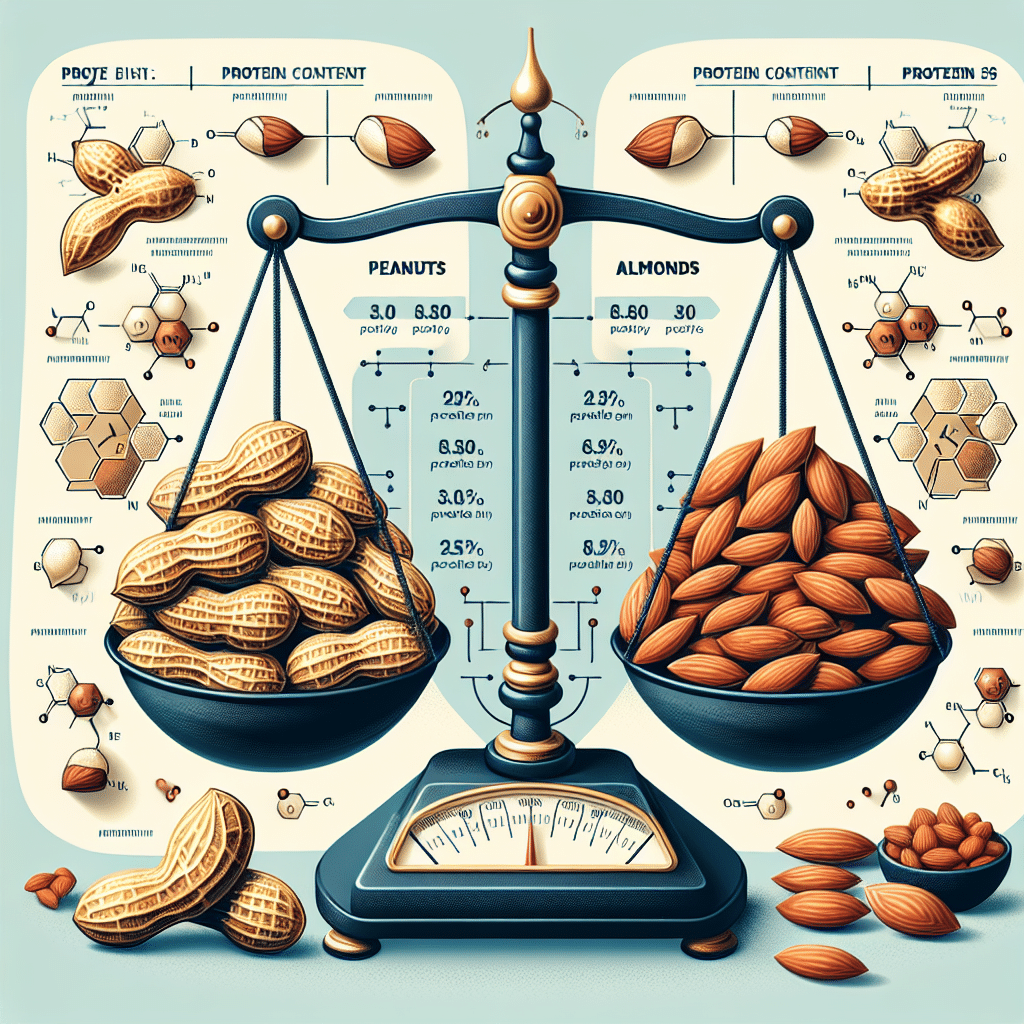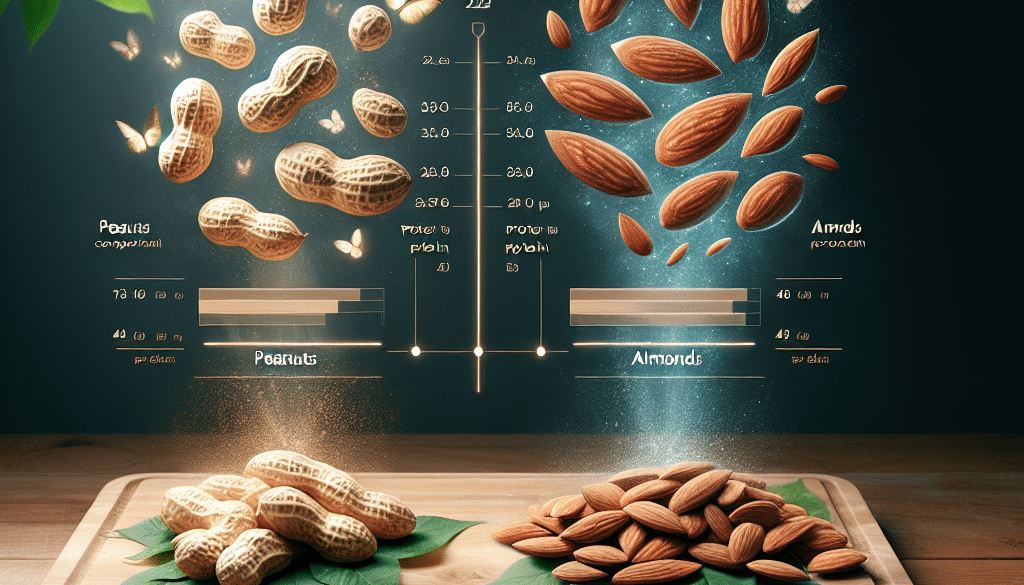Are Peanuts Better Than Almonds For Protein?
-
Table of Contents
- Peanuts vs. Almonds: Which Nut Reigns Supreme for Protein?
- Nutritional Breakdown: Peanuts vs. Almonds
- Protein Quality and Bioavailability
- Health Benefits Beyond Protein
- Considerations for Allergies and Dietary Restrictions
- Environmental Impact
- Cost and Accessibility
- Conclusion: Balancing Protein and Overall Nutritional Value
- Discover ETprotein’s High-Quality Protein Products
Peanuts vs. Almonds: Which Nut Reigns Supreme for Protein?

When it comes to snacking for health and fitness, nuts are often the go-to choice for many. Packed with protein, healthy fats, and various essential nutrients, they are considered a powerhouse of nutrition. Among the vast array of nuts, peanuts and almonds are two of the most popular choices. But which one is better for protein? This article delves into the nutritional profiles of peanuts and almonds to determine which nut might be the superior source of protein for your dietary needs.
Nutritional Breakdown: Peanuts vs. Almonds
Before we can compare the protein content of peanuts and almonds, it’s essential to understand their overall nutritional makeup. Here’s a quick overview of what these nuts have to offer per ounce (28 grams):
- Peanuts: Roughly 7 grams of protein, 14 grams of fat (with 2 grams of saturated fat), 4.5 grams of carbs (including 2.4 grams of fiber), and 161 calories.
- Almonds: Approximately 6 grams of protein, 14 grams of fat (with 1 gram of saturated fat), 6 grams of carbs (including 3.5 grams of fiber), and 164 calories.
At first glance, peanuts have a slight edge in protein content. However, the difference is minimal, and both nuts offer a similar calorie and fat profile, though almonds have a higher fiber content.
Protein Quality and Bioavailability
While the quantity of protein is important, the quality and bioavailability of that protein are equally crucial. Proteins are made up of amino acids, and a “complete” protein contains all nine essential amino acids that the body cannot produce on its own.
Peanuts are considered a complete protein, albeit with lower levels of some essential amino acids like methionine. Almonds, on the other hand, are also a good source of protein but are slightly lower in lysine, making them less complete than peanuts.
However, when consumed as part of a varied diet, both nuts can contribute to a complete amino acid profile. It’s also worth noting that the body’s ability to utilize the protein (bioavailability) from nuts is generally lower than that from animal sources due to inhibitors present in nuts that can affect digestion and absorption.
Health Benefits Beyond Protein
Protein isn’t the only factor to consider when choosing between peanuts and almonds. Both nuts offer a range of health benefits:
- Heart Health: Both nuts contain heart-healthy monounsaturated fats and have been associated with reduced risk of heart disease.
- Antioxidants: Almonds are rich in vitamin E, an antioxidant that protects cells from damage, while peanuts contain resveratrol, the same antioxidant found in red wine.
- Weight Management: Despite their calorie density, nuts have been shown to support weight management due to their satiating properties.
These benefits make both peanuts and almonds a valuable addition to a balanced diet, regardless of their protein content.
Considerations for Allergies and Dietary Restrictions
When choosing between peanuts and almonds, it’s essential to consider allergies and dietary restrictions. Peanuts are one of the most common allergens and can cause severe reactions in some individuals. Almonds, while also a potential allergen, are typically less commonly associated with severe allergic reactions.
For those following specific dietary plans, such as a paleo or ketogenic diet, almonds might be the preferred choice due to their lower carbohydrate content and higher fiber, which can help maintain ketosis.
Environmental Impact
The environmental footprint of food production is an increasingly important consideration for many consumers. Almonds require more water to grow than peanuts, which could be a concern in areas with water scarcity. Peanuts, being legumes, have the added benefit of fixing nitrogen in the soil, which can reduce the need for synthetic fertilizers and improve soil health.
Cost and Accessibility
Cost and accessibility can also influence the choice between peanuts and almonds. Peanuts are generally less expensive than almonds and are widely available in various forms, including whole nuts, butter, and flour. Almonds can be pricier and may not be as readily available in all regions.
Conclusion: Balancing Protein and Overall Nutritional Value
In the debate over whether peanuts or almonds are better for protein, it’s clear that both nuts have their merits. Peanuts slightly edge out almonds in protein content, but the difference is minimal. The choice between the two should also consider factors like overall nutritional benefits, allergies, dietary restrictions, environmental impact, and cost.
Ultimately, incorporating a variety of nuts into your diet, including both peanuts and almonds, can provide a broad spectrum of nutrients and health benefits. For those looking to increase their protein intake specifically, peanuts might be a slightly better option, but almonds offer other nutritional advantages that make them a worthy contender.
Discover ETprotein’s High-Quality Protein Products
If you’re looking to supplement your diet with additional protein sources, ETprotein offers a range of organic and high-purity protein products. Their selection includes peanut protein, which can be an excellent addition to your diet for that extra protein boost. ETprotein’s products are non-GMO, allergen-free, and cater to various industries, ensuring that you have access to the best protein supplements available.
For more information on ETprotein’s offerings or to sample their products, reach out to them at sales(at)ETprotein.com today.
About ETprotein:
ETprotein, a reputable protein and L-(+)-Ergothioneine (EGT) Chinese factory manufacturer and supplier, is renowned for producing, stocking, exporting, and delivering the highest quality organic bulk vegan proteins and L-(+)-Ergothioneine. They include Organic rice protein, clear rice protein, pea protein, clear pea protein, watermelon seed protein, pumpkin seed protein, sunflower seed protein, mung bean protein, peanut protein, and L-(+)-Ergothioneine EGT Pharmaceutical grade, L-(+)-Ergothioneine EGT food grade, L-(+)-Ergothioneine EGT cosmetic grade, L-(+)-Ergothioneine EGT reference grade and L-(+)-Ergothioneine EGT standard. Their offerings, characterized by a neutral taste, non-GMO, allergen-free attributes, with L-(+)-Ergothioneine purity over 98%, 99%, cater to a diverse range of industries. They serve nutraceutical, pharmaceutical, cosmeceutical, veterinary, as well as food and beverage finished product distributors, traders, and manufacturers across Europe, USA, Canada, Australia, Thailand, Japan, Korea, Brazil, and Chile, among others.
ETprotein specialization includes exporting and delivering tailor-made protein powder and finished nutritional supplements. Their extensive product range covers sectors like Food and Beverage, Sports Nutrition, Weight Management, Dietary Supplements, Health and Wellness Products, and Infant Formula, ensuring comprehensive solutions to meet all your protein needs.
As a trusted company by leading global food and beverage brands and Fortune 500 companies, ETprotein reinforces China’s reputation in the global arena. For more information or to sample their products, please contact them and email sales(at)ETprotein.com today.












